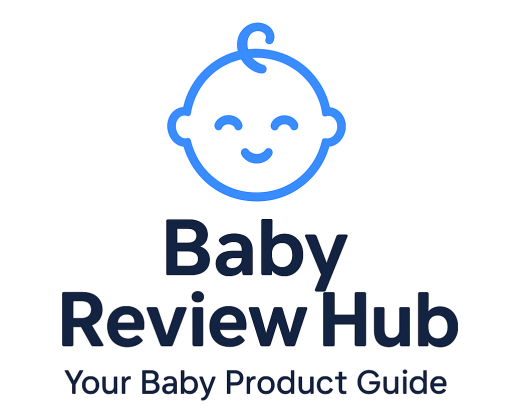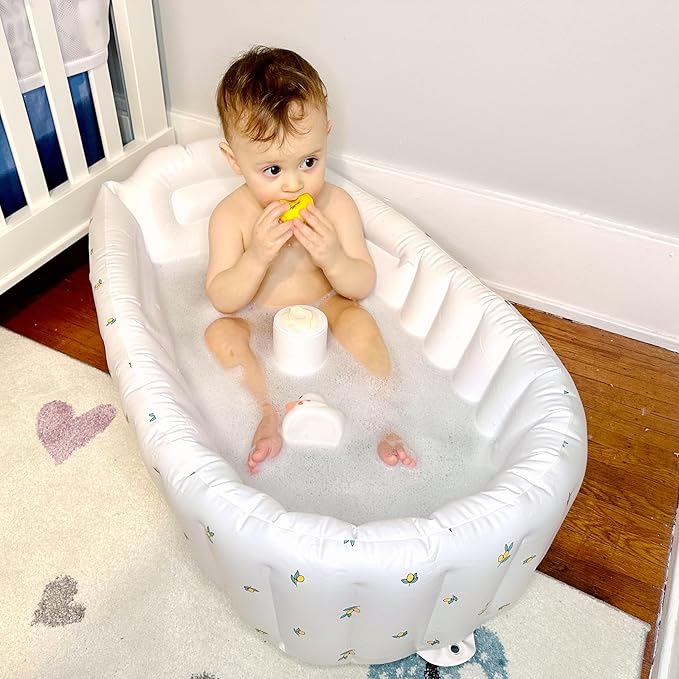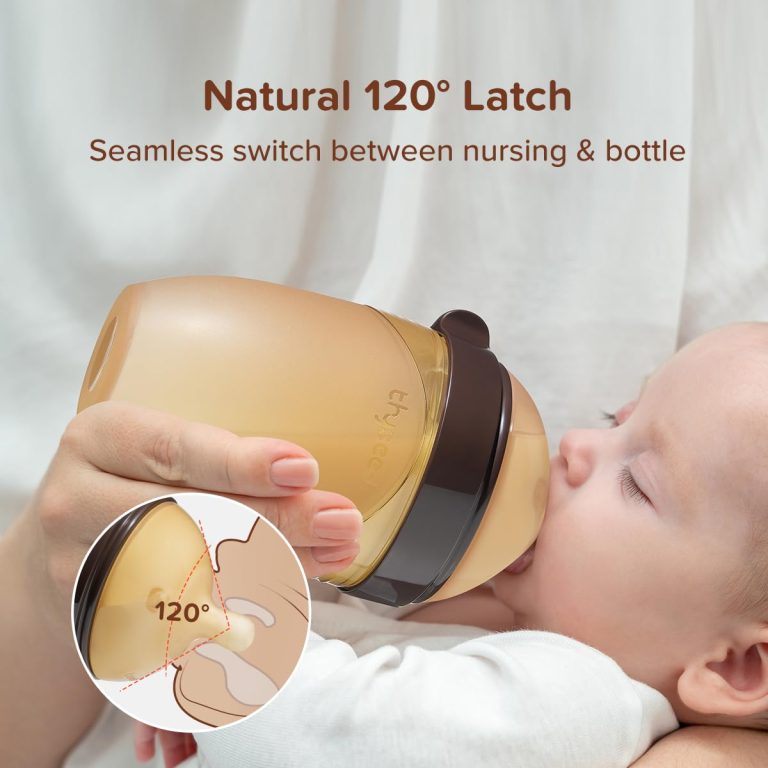Baby Hiccups: Causes, Remedies & When to Worry
Almost every parent has watched their newborn hiccup and wondered, “Is this normal?” The good news is that baby hiccups are common and usually harmless. Still, knowing why they happen and how to ease them can bring peace of mind.
Understanding baby hiccups and their triggers can help parents manage this common occurrence more effectively. For instance, when babies consume milk too quickly, they may gulp air, leading to hiccups. Parents often notice that hiccups tend to happen after a vigorous feeding session, especially if the baby is excited or upset.
 Why Do Babies Get Hiccups?
Why Do Babies Get Hiccups?
Another reason babies might experience hiccups is due to their developing nervous systems. As their bodies learn to coordinate breathing and swallowing, unexpected contractions can occur. This is a normal part of their growth, similar to how they might startle easily or react to sudden movements.
Hiccups occur when the diaphragm — the muscle that helps us breathe — contracts involuntarily. In babies, this happens more often because their digestive and respiratory systems are still developing.
 Common Triggers of Baby Hiccups
Common Triggers of Baby Hiccups
One of the most frequent causes of hiccups in infants is overfeeding or feeding too quickly. When a baby’s tiny stomach fills up faster than it can process, the sudden expansion can irritate the diaphragm — the muscle that controls breathing. This irritation often results in those familiar, rhythmic hiccup sounds. Parents may notice hiccups are more common after large or rushed feeds.
Another common trigger is swallowing air during feeding. Whether a baby is breastfeeding or bottle-feeding, gulping air along with milk can cause bubbles to form in the stomach. These bubbles can press against the diaphragm, prompting hiccups. Proper burping techniques and paced feeding can help reduce this type of hiccup episode.
Sudden temperature changes can also play a role. A quick shift, such as moving from a warm environment to cooler air or drinking milk that’s a different temperature than expected, may cause the diaphragm to react with spasms. This is the body’s way of adjusting to abrupt changes in comfort.
Finally, something as simple as excitement or mild irritation of the diaphragm can set off hiccups. Babies are highly sensitive, and even small emotional or physical stimulations can affect their breathing patterns and trigger the hiccup reflex.
Interestingly, hiccups are not just limited to life outside the womb. Even unborn babies can get hiccups, and many expectant mothers report feeling gentle, rhythmic movements in their bellies that are later understood to be fetal hiccups. These are perfectly normal and are thought to be a sign of healthy development as the baby practices breathing movements before birth.
 How to Stop Baby Hiccups
How to Stop Baby Hiccups
Although baby hiccups are usually harmless and resolve on their own, many parents naturally want to comfort their little one and help shorten the episode. There are several gentle remedies that can make hiccups less bothersome and may even stop them more quickly.
Pause Feeding & Burp
One of the simplest steps is to pause feeding for a few minutes. Overfeeding or swallowing air during a feed often contributes to hiccups, so stopping allows the stomach and diaphragm to settle. During this break, gently burp your baby by holding them upright against your shoulder and patting or rubbing their back. This helps release any trapped air bubbles that may be irritating the diaphragm and triggering hiccups.
Change Feeding Position
Another helpful adjustment is to keep your baby more upright during feeding. When a baby feeds lying flat, they are more likely to swallow excess air along with milk. By positioning them at a slight angle or in a more vertical posture, you can reduce air intake and give their diaphragm more stability. This small change in positioning can make a noticeable difference, especially for babies prone to frequent hiccups.
Use a Pacifier
Offering a pacifier is another gentle way to ease hiccups. The sucking motion helps relax the diaphragm, which can interrupt the cycle of spasms that cause hiccups. Many babies find comfort in sucking, so a pacifier provides both physical relief and emotional soothing at the same time. Buy from Amazon
Offer Smaller, Frequent Feeds
Feeding your baby in smaller, more frequent amounts can help reduce the likelihood of hiccups altogether. When the stomach becomes too full too quickly, the diaphragm is more likely to spasm. Spacing out feeds and offering smaller portions ensures the stomach fills gradually, minimizing the chances of irritation.
Finally, it’s important to remember that sometimes the best solution is simply comforting your baby through the episode. Many parents find that holding their baby close and gently swaying can calm them when hiccups strike. The warmth, motion, and reassurance of a caregiver’s presence often soothe babies more effectively than any technique on its own, allowing hiccups to pass naturally while keeping your baby relaxed.
 How to Prevent Baby Hiccups After Feeding
How to Prevent Baby Hiccups After Feeding
Although hiccups are common and usually harmless, parents often prefer to take steps that can reduce their frequency after feeding. By making small adjustments to feeding routines and post-meal care, you can help your baby’s diaphragm stay calm and avoid unnecessary discomfort.
Burp During Feeds
One of the most effective ways to prevent hiccups is to burp your baby regularly during feeding. If you’re bottle-feeding, aim to burp your baby every 2–3 ounces. For breastfeeding, burp your baby when switching sides. This helps release any trapped air before it has a chance to build up and press on the diaphragm. Frequent burping also reduces spit-ups and gas, making feeding more comfortable overall.
Keep Baby Upright After Feeding
Once feeding is complete, it’s best to keep your baby upright for 20–30 minutes. Holding them in a gentle, vertical position allows milk to settle properly in the stomach while reducing the chance of swallowed air rising and causing irritation. Many parents find that placing their baby against the chest or shoulder during this time is not only effective but also comforting for the baby.
Avoid Vigorous Play After Meals
Babies may seem happy and playful after eating, but bouncing, rough handling, or vigorous play too soon after feeding can easily trigger hiccups. The sudden jostling movement can irritate the diaphragm and bring on spasms. Instead, give your baby a calm, quiet period after meals to digest peacefully before engaging in active play or tummy time.
By following these simple steps — frequent burping, keeping your baby upright, and avoiding too much activity right after meals — you can greatly reduce the likelihood of post-feeding hiccups while also supporting your baby’s comfort and digestion.
 When to Call the Doctor
When to Call the Doctor
For most babies, hiccups are a normal and harmless part of early development. They often resolve on their own and rarely indicate anything serious. However, there are situations where frequent or troubling hiccups may be a sign of an underlying issue that deserves medical attention. Parents should be aware of the red flags so they can seek guidance when necessary.
Painful or Distressing Hiccups
If hiccups seem to cause your baby visible discomfort or distress, it’s worth bringing up with your pediatrician. While occasional hiccups may make a baby fussy, they should not cause crying spells, arching, or other signs of pain. If they do, it could point to irritation or reflux that needs evaluation.
Interfering With Feeding or Sleep
Hiccups that regularly disrupt feeding or sleep can become problematic. For example, if your baby frequently stops feeding because of hiccups, refuses to latch again, or struggles to stay asleep due to constant spasms, the hiccups are no longer just a minor annoyance. Discussing this pattern with a doctor can help rule out reflux or other digestive issues.
Accompanied by Other Symptoms
If hiccups occur together with coughing, vomiting, or breathing difficulties, medical advice should be sought promptly. These additional symptoms may indicate gastroesophageal reflux, allergies, or other health concerns that need attention. Babies should not appear to be choking, gasping, or struggling for air during hiccup episodes.
In summary, while hiccups are almost always harmless, parents should trust their instincts. If your baby’s hiccups seem painful, interfere with daily routines, or come with other concerning symptoms, it’s best to contact your pediatrician for reassurance and guidance.
 Key Takeaway
Key Takeaway
Baby hiccups are a normal part of infancy and usually nothing to worry about. Simple strategies like burping, pacifiers, and upright feeding positions can help. If you’re ever unsure, reach out to your pediatrician for reassurance.
Feeding time can be a source of joy and bonding, yet it also poses the risk of hiccups. Keeping an eye on the baby’s cues during feeding can help mitigate this issue. If they seem restless, it may be a sign to take a break and allow them to relax before continuing.
Additionally, parents can create a more conducive feeding environment by ensuring the baby is not overstimulated. A quiet, calm setting may reduce the likelihood of hiccups occurring post-feeding.
It’s essential to monitor the frequency and duration of hiccups. While sporadic hiccups are normal, persistent hiccups lasting more than an hour could indicate an underlying issue. Parents should document these occurrences and discuss them with their pediatrician during check-ups.
In summary, embracing the experience of baby hiccups, while also being informed and attentive, can enhance the parenting journey. By understanding triggers, employing effective remedies, and knowing when to contact a pediatrician, parents can navigate this common phase smoothly. Baby hiccups are a normal part of infancy and usually nothing to worry about. Simple strategies like burping, pacifiers, and upright feeding positions can help. If you’re ever unsure, reach out to your pediatrician for reassurance.






